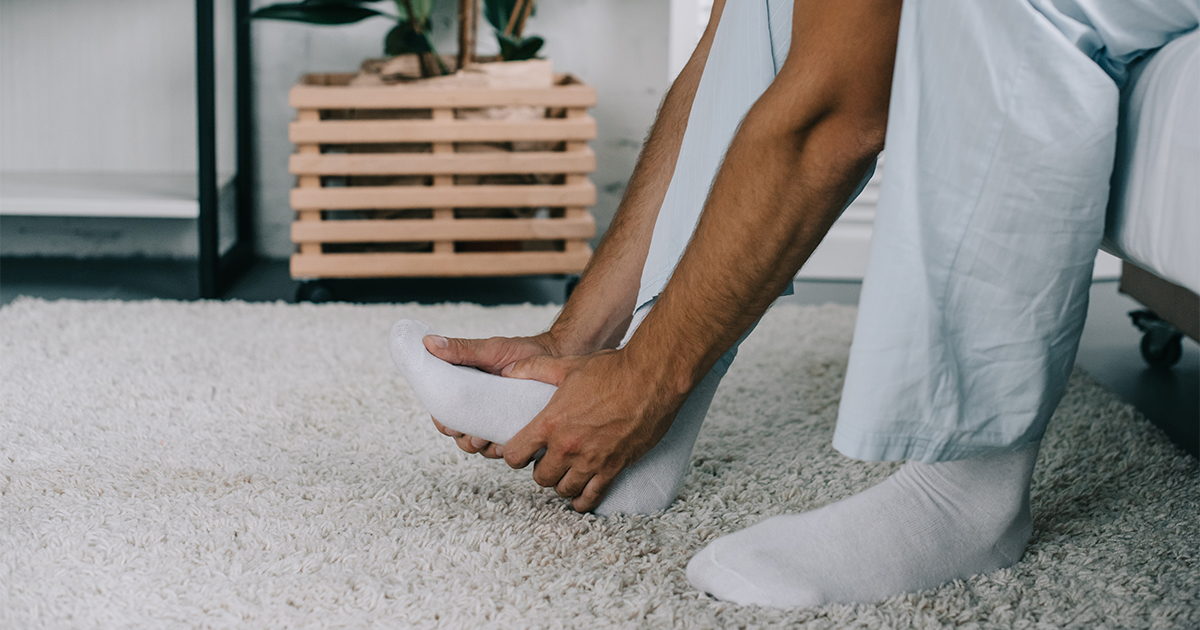Unmistakable Red Flags Your Backbone Might Be Screaming for Help
Your spine is the foundation of your body’s movement, strength, and flexibility—yet many people ignore the warning signs when something goes wrong. Whether it’s minor stiffness or debilitating pain, your backbone may be desperately signaling for help, and dismissing these symptoms can lead to chronic issues, nerve damage, or even loss of mobility. Back problems don’t always happen suddenly. They often develop gradually, with small warning signs that worsen over time. From unexplained pain and tingling sensations to postural changes and persistent stiffness, the body often drops clear hints that your spine needs attention. Recognizing these red flags early can make all the difference in preventing serious spinal conditions and maintaining long-term health. To help you stay ahead of potential issues, we’ve expanded our list to 20 unmistakable signs that your backbone might be in trouble. If you’ve been experiencing any of these symptoms, it might be time to listen to what your spine is trying to tell you.
1. Numbness or Tingling in Your Limbs

If you experience persistent numbness or tingling in your arms, hands, legs, or feet, your spine might be the culprit. The spinal cord houses crucial nerve pathways that branch out to the rest of the body. When vertebrae shift, discs herniate, or nerves become compressed, these essential communication pathways are disrupted. This can result in strange, persistent sensations—often described as pins and needles, burning, or weakness. While occasional numbness may not be alarming, chronic or worsening symptoms signal an underlying spinal issue that could lead to long-term nerve damage if left untreated.
2. Sudden, Unexplained Muscle Spasms

A random muscle spasm is normal after a tough workout or a long day on your feet, but frequent, involuntary spasms may point to a deeper spinal problem. When spinal nerves are irritated, misaligned vertebrae or compressed discs can trigger muscle tightness, cramping, and even painful spasms. These sudden contractions often occur in the lower back, shoulders, or neck and may worsen after prolonged sitting, standing, or lifting heavy objects. If you find yourself experiencing recurring spasms, your spine may be struggling to support your body's movements, and addressing the root cause is essential.
3. Persistent Back Stiffness That Won’t Go Away

Waking up with a stiff back every once in a while isn’t unusual, but chronic stiffness could indicate spinal trouble. The stiffness may be caused by degenerative disc disease, arthritis, poor posture, or a misaligned spine. Over time, these conditions can reduce spinal flexibility, making everyday activities—like bending down to tie your shoes—painful or difficult. If your back feels locked up more often than not, or if stretching and movement don’t relieve the stiffness, it could be a sign that your spine is struggling to function properly.
4. Sharp, Shooting Pain in Your Legs or Arms

Pain that radiates from the lower back down through the leg or from the neck into the arms is often a sign of nerve compression in the spine. This type of pain is commonly linked to conditions like sciatica or cervical radiculopathy, where herniated discs or bone spurs press against spinal nerves. This can cause intense, shooting pain, weakness, or numbness along the nerve’s path. If you feel electric-like pain traveling down your limbs, your spine may be sending out a distress call that needs medical attention.
5. Discomfort When Standing or Sitting for Long Periods

If you feel an increasing need to shift positions or take breaks while sitting or standing, your spine could be under strain. Slipped discs, muscle imbalances, or spinal misalignment can put excessive pressure on your back, making it uncomfortable to remain in one position for too long. Some people experience relief when they change posture, while others notice that movement makes their discomfort worse. Either way, chronic pain or restlessness from sitting or standing could mean your backbone is struggling to support you properly.
6. Frequent Headaches or Neck Pain

A misaligned or strained spine doesn’t just affect your back—it can also trigger chronic headaches and neck tension. Poor posture, spinal misalignment, and pinched nerves in the cervical spine can lead to tension headaches, migraines, and even dizziness. If your headaches are accompanied by neck stiffness or a feeling of tightness in your upper back and shoulders, your spine may be at the root of the problem.
7. Uneven Shoulders or Posture Changes

Have you noticed that one shoulder sits higher than the other, or that your posture has changed over time? These could be warning signs of spinal misalignment or scoliosis. When the spine is out of balance, it can cause one side of the body to compensate, leading to muscle strain, poor posture, and even chronic pain. If left untreated, postural imbalances can worsen over time, increasing the risk of nerve compression, muscle fatigue, and joint problems.
8. Sudden Weakness in Your Legs or Arms

If you experience unexplained muscle weakness—such as struggling to lift objects you normally could, or feeling like your legs might give out—it could be a sign of nerve compression or spinal cord dysfunction. Weakness in the arms might indicate cervical spine issues, while leg weakness can point to lumbar spine problems. If you notice a gradual decline in strength or sudden episodes of muscle failure, don’t ignore it—your spine could be struggling to send proper signals to your muscles.
9. Pain That Worsens at Night or in the Morning

Many people experience back pain that fluctuates throughout the day, but pain that peaks at night or first thing in the morning can be a red flag. Conditions like arthritis, spinal inflammation, or degenerative disc disease often cause stiffness and discomfort when the spine has been in a resting position for long periods. If you wake up feeling sore or if lying down makes your pain worse instead of better, it’s time to take a closer look at your spinal health.
10. Tingling or Numbness in the Hands or Feet

Spinal issues can affect nerves far from the back itself, leading to numbness, tingling, or burning sensations in the hands and feet. These symptoms may point to conditions like herniated discs, spinal stenosis, or nerve entrapment. If the tingling persists or worsens, it could indicate nerve damage, which is best treated early to prevent long-term issues.
11. A Hunched or Rounded Upper Back

If you’ve noticed that your upper back is rounding forward, especially when sitting or standing, your spine may be trying to tell you something. This posture—sometimes referred to as kyphosis or a "hunchback"—can develop from poor posture, osteoporosis, or weakened spinal muscles. Over time, the excessive forward curve of the spine can strain the neck and lower back, leading to chronic pain, stiffness, and even breathing difficulties. If left untreated, it can progress to a more rigid and permanent deformity, making early intervention crucial.
12. Clicking or Popping Sounds in Your Back or Neck

While occasional joint cracking is normal, frequent or painful popping sounds in the spine could be a warning sign. Clicking or grinding sensations in your neck or lower back may indicate wear and tear in the spinal joints, misaligned vertebrae, or cartilage degeneration. Conditions like facet joint syndrome or early arthritis can cause these noises as the joints rub together improperly. If the sounds are accompanied by pain or stiffness, it’s time to have your spine evaluated.
13. Unexplained Digestive Issues

It may come as a surprise, but spinal misalignment or nerve compression in the lower back can impact your digestive system. The spine plays a major role in regulating nerve signals to the intestines and stomach. If these signals are disrupted due to a compressed nerve or spinal misalignment, you may experience bloating, constipation, acid reflux, or irritable bowel symptoms. If persistent digestive issues occur alongside back discomfort, your spine may be a contributing factor.
14. Frequent Foot Pain or Changes in Walking Patterns

Your feet and spine are closely connected, and spinal problems can sometimes show up in unexpected ways—like chronic foot pain or a change in the way you walk. Misalignment in the lower spine or nerve compression (such as from a herniated disc) can alter your gait, cause foot drop, or lead to uneven weight distribution, resulting in persistent foot pain, shin splints, or stress fractures. If you're dealing with unexplained foot discomfort, it might be time to examine your spine’s role in the issue.
15. Loss of Grip Strength or Hand Coordination

If you suddenly find it harder to hold objects, button your shirt, or perform tasks requiring fine motor skills, your cervical spine could be involved. Compression of the nerves in the neck can weaken grip strength and affect hand-eye coordination, dexterity, and even writing ability. This often stems from conditions like cervical radiculopathy, herniated discs, or degenerative spinal changes affecting nerve function. Ignoring these symptoms could lead to further loss of motor control.
16. Feeling of Heaviness or Fatigue in the Legs

If your legs often feel heavy, sluggish, or as if they are "dragging," your spine might be struggling to support your movements. Spinal stenosis, sciatica, and lumbar disc problems can compress nerves that control leg function, making movement more difficult. Some individuals also report a feeling of "tightness" or restless legs when trying to walk. If leg fatigue worsens over time, it may be a signal that spinal nerve compression is progressing.
17. Sensitivity to Cold or Temperature Changes

Spinal nerve issues don’t just cause pain—they can also alter your body's ability to regulate temperature. Some individuals with spinal problems report that their extremities feel unusually cold, even in warm environments, or that they experience sudden temperature fluctuations in their back, legs, or arms. These symptoms can arise from nerve dysfunction, poor circulation, or disruptions in the body’s autonomic nervous system—all of which may be traced back to spinal misalignment or nerve damage.
18. Inability to Take Deep Breaths

Your spine plays a significant role in breathing, particularly your thoracic spine (upper back), which supports rib movement. If you struggle to take deep breaths or feel a tight, restricted sensation in your chest, it could indicate spinal dysfunction. Poor posture, compressed nerves, or misaligned ribs can prevent your lungs from expanding fully, leading to shallow breathing and even increased anxiety or fatigue. If deep breathing feels difficult, your backbone may be part of the problem.
19. Frequent Dizziness or Balance Problems

Dizziness or frequent loss of balance isn’t always due to ear problems—it could be linked to your cervical spine (neck). The upper spine houses nerves and blood vessels that affect balance and coordination. If these structures are compressed or irritated, it can lead to vertigo, dizziness, or unsteady walking. Cervical misalignment can also affect blood flow to the brain, compounding balance-related issues. If you often feel off-balance, your spine could be playing a hidden role.
20. Chronic Fatigue That Doesn’t Improve With Rest

If you’re constantly exhausted despite getting enough sleep, your spine could be a contributing factor. Spinal misalignment, nerve dysfunction, and poor posture can lead to muscle overuse, energy depletion, and even disruptions in sleep quality. Nerve compression in the cervical or lumbar spine may also impair communication between the brain and body, making even minor physical tasks feel draining. Addressing spinal issues could be a key step in reducing fatigue and improving energy levels.
Listen to Your Spine Before It’s Too Late

Your spine is your body's foundation, and when it starts sending distress signals, it's important to listen. Chronic back pain, nerve-related symptoms, and postural changes are all warning signs that something isn’t right. While occasional stiffness or discomfort is normal, persistent or worsening symptoms can indicate underlying spinal problems that may lead to serious complications if ignored. By catching these red flags early, you can take action through lifestyle changes, physical therapy, or medical treatment to prevent further damage and keep your spine healthy. Whether it’s adjusting your posture, strengthening your core, or seeking professional care, prioritizing your spinal health today can help you avoid pain, reduced mobility, and long-term complications down the road. If you recognize any of these unmistakable signs, it might be time to consult a healthcare provider, chiropractor, or physical therapist to keep your backbone strong and pain-free for years to come.
